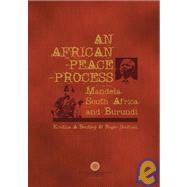
| Foreword by Nelson Mandela | ix | ||||
| Preface | xi | ||||
| Acknowledgements | xv | ||||
| About the authors | xvii | ||||
| List of abbreviations | xviii | ||||
|
1 | (4) | |||
|
5 | (16) | |||
|
6 | (2) | |||
|
8 | (4) | |||
|
12 | (9) | |||
|
21 | (10) | |||
|
21 | (1) | |||
|
22 | (2) | |||
|
24 | (4) | |||
|
28 | (3) | |||
|
31 | (18) | |||
|
32 | (8) | |||
|
40 | (1) | |||
|
41 | (4) | |||
|
45 | (4) | |||
|
49 | (6) | |||
|
49 | (6) | |||
|
55 | (8) | |||
|
57 | (2) | |||
|
59 | (4) | |||
|
63 | (8) | |||
|
63 | (2) | |||
|
65 | (6) | |||
|
71 | (14) | |||
|
73 | (4) | |||
|
77 | (2) | |||
|
79 | (2) | |||
|
81 | (1) | |||
|
82 | (3) | |||
|
85 | (6) | |||
|
85 | (3) | |||
|
88 | (1) | |||
|
89 | (2) | |||
| 10 Burundi's fragile transition: from Buyoya to Ndayizeye | 91 | (10) | |||
|
92 | (1) | |||
|
93 | (1) | |||
|
94 | (1) | |||
|
95 | (6) | |||
| 11 Burundi's transition under Ndayizeye: from impasse to a fragile deal | 101 | (28) | |||
|
102 | (5) | |||
|
107 | (1) | |||
|
108 | (4) | |||
|
112 | (4) | |||
|
116 | (4) | |||
|
120 | (9) | |||
| 12 The contradictory dynamics of democratisation and demilitarisation | 129 | (20) | |||
|
131 | (2) | |||
|
133 | (3) | |||
|
136 | (4) | |||
|
140 | (3) | |||
|
143 | (1) | |||
|
144 | (2) | |||
|
146 | (1) | |||
|
147 | (2) | |||
| 13 Burundian civil society and South African linkages | 149 | (14) | |||
|
150 | (2) | |||
|
152 | (2) | |||
|
154 | (4) | |||
|
158 | (1) | |||
|
159 | (4) | |||
| 14 Sustaining the peace: lessons from South Africa? | 163 | (28) | |||
|
164 | (5) | |||
|
169 | (2) | |||
|
171 | (5) | |||
|
176 | (3) | |||
|
179 | (3) | |||
|
182 | (9) | |||
| 15 Concluding observations: Mandela, South Africa and Burundi | 191 | (8) | |||
|
191 | (3) | |||
|
194 | (1) | |||
|
195 | (4) | |||
| Postscript: 'We cannot accept to die like hens' - Tutsi fears and regional peace | 199 | (10) | |||
|
200 | (3) | |||
|
203 | (6) | |||
| Bibliography and other sources | 209 |
The New copy of this book will include any supplemental materials advertised. Please check the title of the book to determine if it should include any access cards, study guides, lab manuals, CDs, etc.
The Used, Rental and eBook copies of this book are not guaranteed to include any supplemental materials. Typically, only the book itself is included. This is true even if the title states it includes any access cards, study guides, lab manuals, CDs, etc.